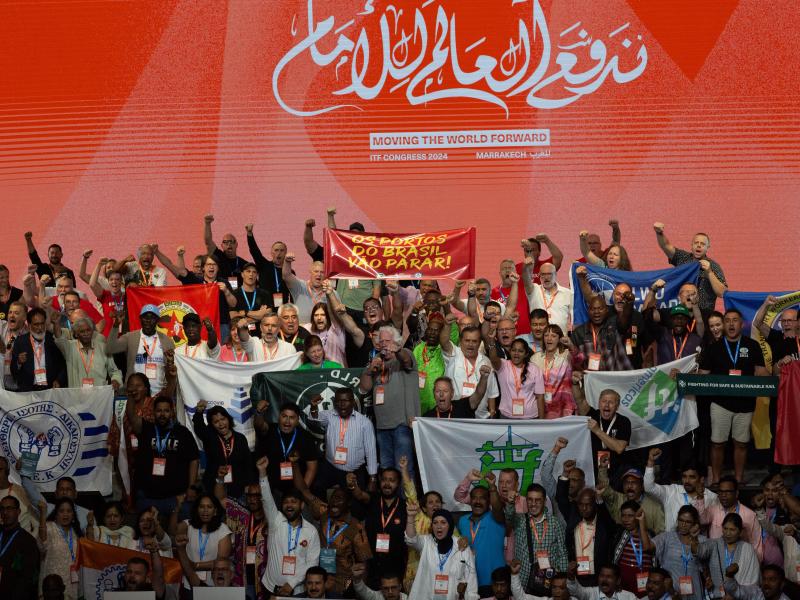Whether they’re facing unjust criminalisation, bad working and living conditions, or poor gender equality, the global economy’s keyworkers deserve much better.
Navigating a positive way forward for seafarers was at the heart of plans confirmed at the Seafarers’ Section conference today in Marrakech - with the urgent need for a just transition flagged as a catalyst for change.
Improving seafarers’ conditions is a long-established and successful core agenda of the International Transport Workers’ Federation (ITF) and its affiliated maritime unions – and delegates confirmed it will remain central to the ITF’s work over the next five-year plan for the Seafarers’ Section.
“We will continue to build a future in which seafarers are recognised, valued, respected, protected,” said ITF Seafarers Section Chair, David Heindel. “Let there be no doubt that the ITF and all its affiliated unions will always stand shoulder to shoulder with unjustly treated seafarers, wherever they may be and whatever they may be facing.”
In the five years since the 44th ITF Congress in Singapore, seafarers have faced continuous challenges, including the Covid-19 pandemic and crew change crisis, record and still increasing levels of seafarer abandonment, wars and conflicts affecting seafarers, and the worsening of the global scourge of seafarer criminalisation and unfair treatment in which seafarers are detained and denied access to the rules of justice.
ITF seafarers’ unions confirmed their commitment to bringing in more women and young seafarers – for the profession to be seen as a good career for the next seafaring generation.
“It’s clear that we’ve come a long way – there are five men and five women on this top table,” said Seafarers’ Section Committee member, Susana Pereira-Ventura.
“The ITF is deeply involved in the process of transformation of the industry at the International Maritime Organization (IMO). We also need to do a bit of work so that young people, globally, see the profession as a good career, and this must come from securing young workers’ rights and giving them protections.”
A future concern for seafarer safety, the handling of potentially dangerous new fuels, is already being addressed by the ITF in collaboration with industry and international organisation partners – a mutually beneficial collaboration only enhanced through joint work during the pandemic. As it always has, the Seafarers’ Section agreed in Marrakech that it must continue to ensure that its strategy for change to 2029 spans advocacy on regulation, holding states and shipowners to account, and building awareness among seafarers of their rights.
Established at COP 26 in Glasgow in 2021, the ‘Maritime Just Transition Task Force’ brings together the ITF, the International Chamber of Shipping (ICS), the United Nations Global Compact (UNGC), the International Labour Organization (ILO) and the IMO. Only last year, at COP 28 in Dubai, it launched the ‘Baseline Training Framework for Seafarers in Decarbonization’ project to begin providing the skills that it is estimated that 800,000 seafarers will need to acquire, including around potentially dangerous fuels such as ammonia and hydrogen.
“A just transition must be urgently enacted with seafarers at its forefront, from design to delivery. If it’s done this way, a just transition can bring real benefits to seafarers, the industry and the planet as a whole – and that’s precisely why it’s a central pillar of our work,” said Heindel.
Newly elected Young Transport Workers Representative, Camille Dyan A. Simbulan, said: “The future of seafaring, and the future success of people and communities everywhere around the world amidst the extraordinary challenges of our time, rests on the shoulders of the next generation of seafarers.
“Young people and transport workers everywhere know that we can’t talk about the future without talking climate change – and how we can achieve climate justice while safeguarding workers’ rights and wellbeing.
“As a Filipina from a proud seafaring nation which is heavily impacted by climate change, I am honoured to be representing the ITF’s seafarers as we build and coordinate our work on young maritime workers and a just and equitable transition over the next five years.”
Motions passed at the Conference include a commitment for the Section to build a new, comprehensive, strategy to support and safeguard Ukraine’s seafarers – and railway workers – including prioritising them in the pilot for training under the Maritime Just Transition Taskforce. The adoption of the motion, introduced by Oleg Grygoriuk of the Maritime Transport Workers’ Trade Union of Ukraine (MTWTU), was followed by a rousing standing ovation.
The Conference also welcomed the Australian Government’s commitment to establish an ‘Australian Strategic Fleet’ which will help rebuild an Australian-flagged and crewed merchant fleet, which in turn expands the ITF maritime departments’ work on defending national shipping and cabotage.
Delegates elected David Heindel as the Chair of the Seafarers’ Section, with Conrad Oca as 1st Vice Chair, Mark Dickinson as 2nd Vice Chair, and Lorena Pintor Silva as Women’s Transport Workers’ Representative.
Notes
The full list of motions at the Seafarers Conference:
- Motion 6: Support for the transport workers of Ukraine
- Motion 16: Australian Strategic Fleet
- Motion 22: Motion to address the ineffectiveness of Shipping P&I Club Insurance
- Motion 23: Motion on enhanced cooperation between ITF and Paris Memorandum of Understanding
- Motion 26: Promoting the future of work for young maritime workers



